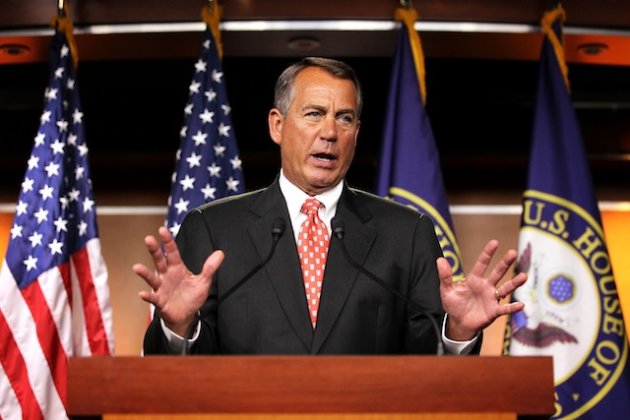MONYWA, Myanmar (AP) — Security forces used water cannons, tear gas and smoke bombs Thursday to clear protesters from a copper mine in northwestern Myanmar, wounding villagers and Buddhist monks in the biggest use of force against demonstrators since the reformist government of President Thein Sein took office last year.
Opposition leader Aung San Suu Kyi, who arrived in the area hours later on a previously scheduled visit, said she would try to negotiate a solution.
In a statement broadcast on state television, the government initially acknowledged using the riot-control measures but denied using excessive force. In an unusual move, it later retracted the statement without explanation.
Monks and other protesters had serious burns after the crackdown at the Letpadaung mine near the town of Monywa. Protesters who oppose the mine's impact on villagers and the environment had occupied the area for 11 days.
"I didn't expect to be treated like this, as we were peacefully protesting," said Aung Myint Htway, a peanut farmer whose face and body were covered with black patches of burned skin.
The police action risks becoming a public relations and political fiasco for Thein Sein's government, which has been touting its transition to democracy after almost five decades of repressive military rule.
"This is unacceptable," said Ottama Thara, a 25-year-old monk who was at the protest. "This kind of violence should not happen under a government that says it is committed to democratic reforms."
Police moved early Thursday to disperse protesters after some heeded earlier warnings to leave.
"Around 2:30 a.m. police announced they would give us five minutes to leave," Aung Myint Htway said. He said police fired water cannons first and then shot what he and others called flare guns.
"They fired black balls that exploded into fire sparks. They shot about six times. People ran away and they followed us," he said, still writhing hours later from pain. "It's very hot."
Photos of the wounded monks showed they had sustained serious burns on parts of their bodies. It was unclear what sort of weapon caused them, or whether the burns were caused by their shelters catching fire from whatever devices police used.
The government had defended its actions in a statement issued by the government's official information office Thursday afternoon. It denied using excessive force and said it used fire hoses, tear gas and smoke bombs according to international standards for riot control. The statement declared that the authorities took action for the sake of rule of law and in the interests of the country and its people, and said the project operated in accordance with international environmental standards.
Later, however, the president's office issued a one-sentence statement recalling the information office's statement without explanation. The move may reflect sensitivities over the injuries monks suffered, or second thoughts over admitting that authorities used force.
Suu Kyi's visit to nearby Kan-Kone village had been scheduled before the crackdown. The Nobel Peace laureate, elected to parliament after spending most of the last two decades under house arrest, unexpectedly went to the mine to meet with its operators before making her speech.
"I already met one side. I met with mine operators. I want to meet with villagers and protesters," she said. "I want to negotiate hearing from both sides."
She asked the crowd to be patient. "I haven't made any decision yet. I want to meet with both sides and negotiate," she said in a speech that lasted less than 15 minutes. "Will you agree with my negotiating?" The crowd shouted its assent.
Some of Suu Kyi's comments suggested that she may not fully embrace the tactics of the protesters. "When dealing with people, I don't always follow what people like. I only tell the truth," she said. "I will work for the long-term benefit of the country."
After her speech she went to the hospital where many of the injured were being treated, and met with protest leaders at the hotel in Monywa where she is staying. Thwe Thwe Win, a female protest leader, said afterward: "We will wait for Aung San Suu Kyi to negotiate with the companies. But we will not stop the protest until we achieve our demands, though I cannot tell you how we will proceed at this point."
Ohn Kyaing, a spokesman for Suu Kyi's National League for Democracy party, said she told the mine's executives that force should not have been used. He said the executives said they did not direct the action, and that it had been the work of the state security forces. Ohn Kyaing said Suu Kyi on Friday would meet with officials in charge of the crackdown, as well as local villagers and their representatives.
Villagers affected by the mine claim they did not receive satisfactory compensation and demand a more comprehensive environmental impact assessment.
The mine, which is being expanded, is a joint venture between a Chinese company and a holding company controlled by Myanmar's military.
Most people remain suspicious of the military, while China is widely seen as having propped up army rule for years, in addition to being an aggressive investor exploiting the country's many natural resources.
Government officials had publicly stated that the protest risked scaring off foreign investment that is key to rebuilding the economy after decades of neglect.
State television had broadcast an announcement Tuesday night that ordered protesters to cease their occupation of the mine by midnight or face legal action. It said the protesters began occupying the mine area Nov. 18, and operations had been halted since then.
Some villagers among a claimed 1,000 protesters left the mine after the order was issued. But others stayed through Wednesday, including about 100 monks.
The protesters' concerns about the mine do not yet appear to be widely shared by the broader public. But hurting monks — as admired for their social activism as they are revered for their spiritual beliefs — is sure to antagonize many.
Aung Myint Htway said he didn't care that police treated him badly but added, "I won't forgive them for what they did to our monks."
According to a nurse at a Monywa hospital, 27 monks and one other person were admitted with burns caused by some sort of projectile that released sparks or embers. Two monks with serious injuries were sent for treatment in Mandalay, Myanmar's second-biggest city, a 2½ hour drive away.
Other evicted protesters gathered at a Buddhist temple about 5 kilometers (3 miles) from the mine's gates.
The protest is the latest major example of increased activism by citizens since the elected government took over last year. Street demonstrations have been legalized, and are generally tolerated, though detentions have occurred in some cases involving sensitive issues.
Political and economic liberalization under Thein Sein has won praise from Western governments, which have eased sanctions imposed on the previous military government because of its poor record on human and civil rights.
However, the military still retains major influence over the government, and some critics fear that democratic gains could be rolled back.
The government's surprise suspension last year of a Chinese-backed hydroelectric project, in response to similar concerns about social and economic consequences, was seen as a significant indicator of its commitment to democratic reform. But China was unhappy about the decision, and Thein Sein's ministers have warned about offending Myanmar's big neighbor to the north and scaring off other foreign investors.
China's foreign ministry defended the mining venture Thursday as mutually beneficial and said that environmental remediation and compensation to relocate affected residents all conformed to Myanmar law.
Like many throughout the country, villagers near the project are keen to have Suu Kyi involved.
"We feel really encouraged when we heard Mother Suu is coming," said Sartone village resident Thein Thein, using a popular familiar term for Suu Kyi. "She's our only hope."
Suu Kyi, however, recently told Myanmar reporters that not everything should be resolved through demonstrations, and sometimes it is better to use negotiations.
 Republican House Speaker John Boehner (Alex Wong/Getty Images)
Republican House Speaker John Boehner (Alex Wong/Getty Images)










